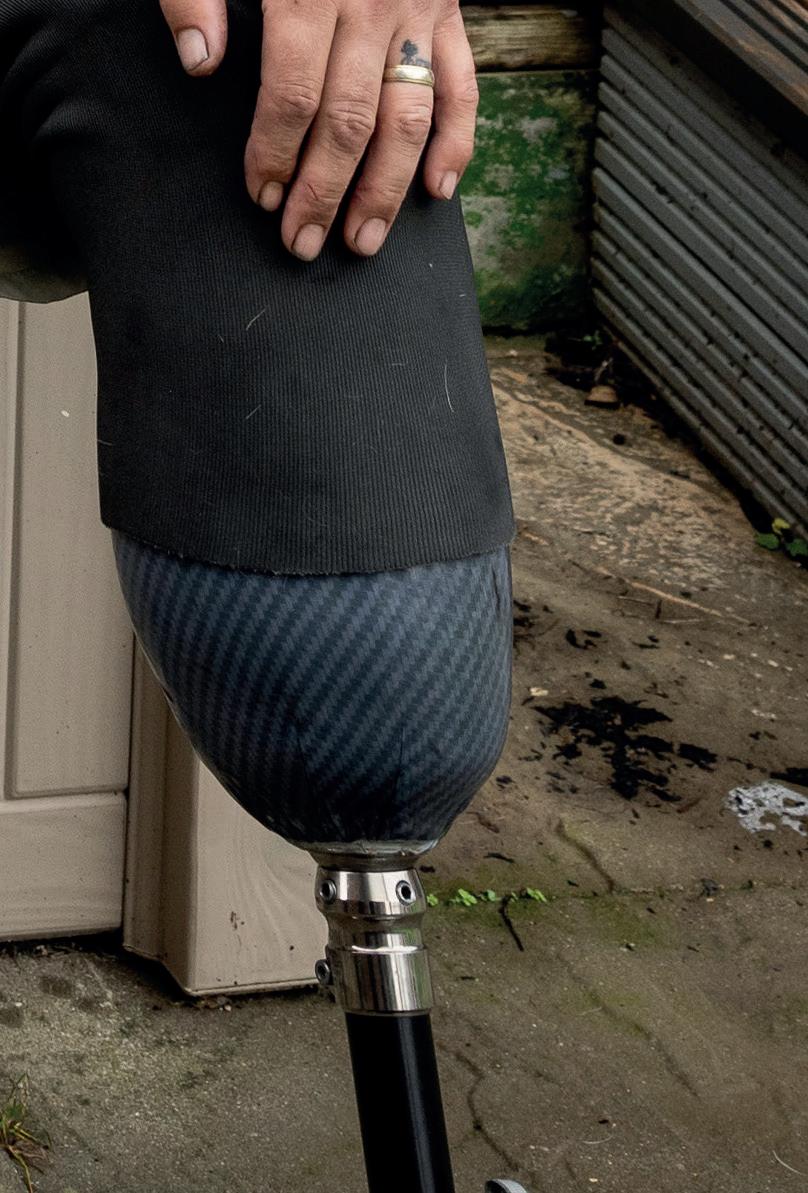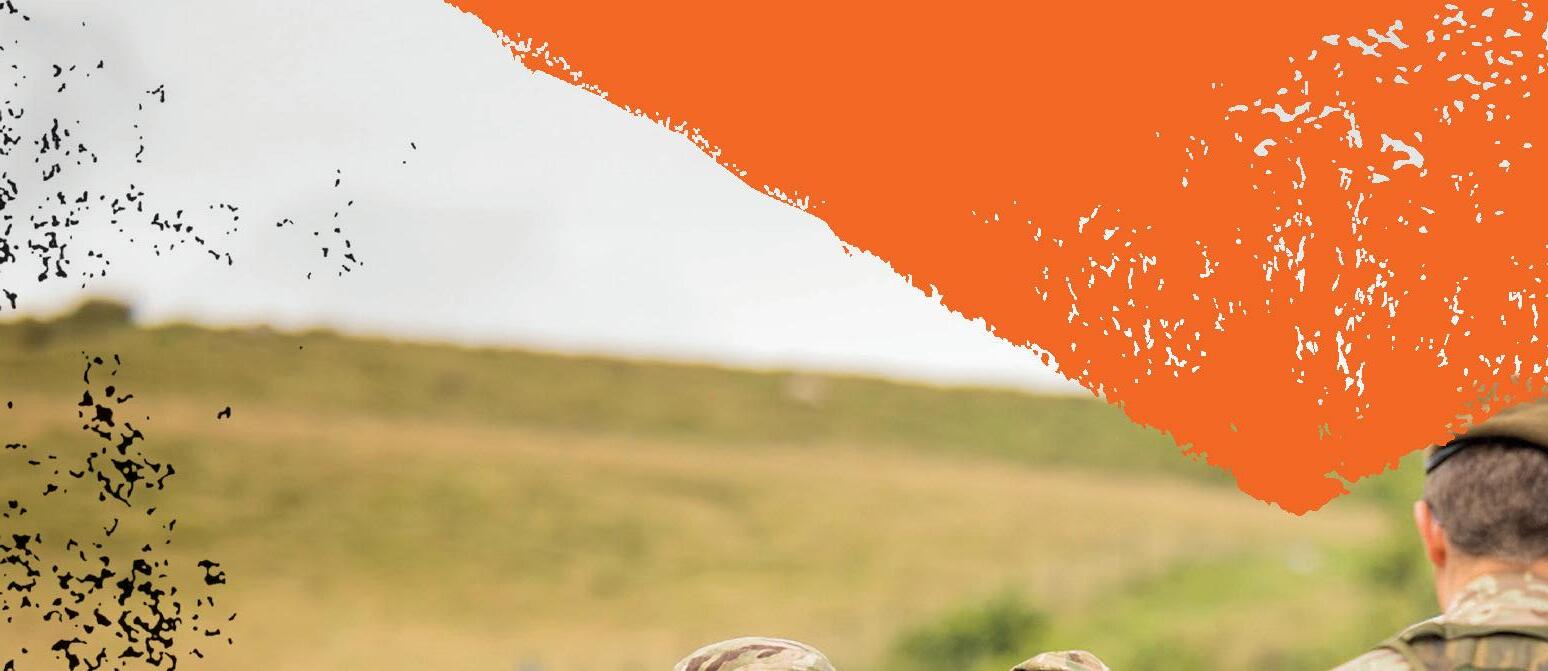













You’ve Spent Your Career Protecting Others - Now Let Us Support You.
Whether you’re planning your departure or have left the armed forces, life after service can bring unexpected challenges. If illness or injury strikes, who’s there to help you and your family?
From just £60 per year, Lady Grover helps cover the costs of care when you need it most - giving you peace of mind as you adapt to civilian life.
Open to serving, transitioning and former armed forces personnel.

Join today for security and support: ladygrover.org.uk


Armed Forces’ Health Support

PUBLISHER
Denise Connelly denise@dcpublishing.co.uk
STAFF WRITER
Kate Stevenson
DESIGN AND PRODUCTION
Lucy Baillie lucy.baillie@dcpublishing.co.uk
SALES
Marian Mathieson marian.mathieson@dcpublishing.co.uk
ADVANCE MAGAZINE www.advancemagazine.co.uk
DC Publishing Ltd,
198 Bath Street, Glasgow, G2 4HG Tel: 0844 249 9007
djusting from military to civilian life brings exciting opportunities, but it also comes with new challenges.
In this issue of Advance, we have a host of helpful advice and resources to guide you on your journey. Find out how to turn your military skills into a rewarding new career, make the most of the support available to you and your family and explore options for retraining



If
9 ELCAS EXPLAINED
The Enhanced Learning Credits scheme could fund your further education.
10 YOUR NEXT CAREER STARTS WITH THE RIGHT TRAINING
Find out what dedicated support you are entitled to help you retrain.
Discover how your military skills could help you in a new career. 13 BUILD YOUR FUTURE
The building materials sector is a booming industry full of opportunities.
4 SUPPORT THAT STARTS BEFORE YOU LEAVE How to make the most of the support and guidance available to service leavers from the CTP. 16 CHAMPIONS IN THE COMMUNITY
How Armed Forces Champions support veterans and service leavers across the UK.
22 SUPPORT FOR FORCES FAMILIES
Taking care of yourself and your family when adjusting to civilian life.
or funding your further education. This issue, we also discuss the importance of mental health awareness with Karl Hinett, hear exclusively from Nichola Tidd about her battle with PTSD, and discover why now is the perfect time to launch your career in the building materials sector. Plus much more inside.
25 COSTS ON CIVVY STREET
Learn how to stay in control of your finances during your transition to civilian life.
18 NOT DONE FIGHTING
Channel 4’s Hunted Star Nichola Tidd speaks exclusively to Advance about her journey with PTSD.
20 LIFE, WORK AND THE CALL TO SERVE Alan Lane on balancing civilian life with his role in the Army Reserve.
30 BREAKING THE ICE
We spoke to Karl Hinett ahead of his gruelling Artic Ultra Challenge with SSAFA to raise awareness of mental health in the Armed Forces.
29 DATES FOR THE DIARY
Plan ahead for these upcoming events.

eaving the Armed Forces can feel daunting, no matter your reason for moving on. That’s where the Career Transition Partnership (CTP) comes in. As the official resettlement programme for service leavers, delivered on behalf of the Ministry of Defence, the CTP offers expert advice and practical support to help you prepare for life after service.
Whether you’ve served for a few years or an entire career, the CTP can support you every step of the way. Services are free and tailored to your needs, with support available up to two years before discharge. Once you’ve received initial guidance from your service branch, the CTP becomes your next point of contact.
You can check your eligibility and register for support at modctp. co.uk, where you’ll also find tools and resources to help plan your next steps. Support includes online and in-person guidance, plus help from nine Resettlement Centres across the UK.
One of the CTP’s key roles is to help you move into civilian employment. That means support with job searches, CVs, interviews and more. A new digital platform gives you tailored job recommendations, access to training, and tools to identify your transferable skills. You’ll also have

What to expect from the Career Transition Partnership (CTP) and how to make the most of the support and guidance available
access to CTP RightJob, the main jobs board for ex-Forces roles.
If you’re considering a new direction, the CTP offers MoDsubsidised training courses and workshops designed to improve your employability. Career Transition Workshops can help you identify your strengths and build confidence in your job search.
CTP Future Horizons supports early service leavers – those who’ve served less than four years – with extra advice, regular checkins and a job bulletin with entrylevel roles and apprenticeships.
CTP Assist is for service leavers being medically discharged. It offers up to two years of personalised support, helping you work towards employment, education or retirement.
Even after you’ve secured a new role, you can return to the CTP for guidance. They also offer resources on topics like finances, pensions, and self-employment to help you plan for the future.
This ongoing support is designed to help you feel more confident in your long-term transition. Whether you’re looking to retrain, change career direction, or update your job search skills, help is available.
FIND OUT MORE Register at modctp.co.uk to explore support, training, and job opportunities.







Matt served in the Princess of Wales’s Royal Regiment for 17 years, but sustained a long-term ankle injury when he risked his life to save his platoon in Afghanistan. Complications that arose from his injury led to the loss of a lower leg. Our charity proudly funded a new electric adjustable bed to improve Matt’s recovery and quality of life.










Leaving the military often means stepping away from the only working world you’ve ever known – which can make the idea of starting a civilian career feel overwhelming. But what you might not realise is that your time in the Forces has equipped you with indemand skills that employers value highly. In this feature, we highlight some of the most useful transferable skills from service life that are sure to impress
One of the most important skills you’ll develop in the military is communication – delivering clear instructions, making complex information easy to understand, adapting to different audiences, and doing it all while under pressure.
Taking responsibility, making decisions and guiding others are all part of daily life in the Forces. Leadership isn’t just about rank – it’s about motivating a team, managing risk, and delivering results, even in high-pressure situations. These are exactly the qualities employers value, whether you’re applying for a team role or a management position. They need to know that you can handle your workload, and step up and manage your colleagues if required.
Civilian workplaces can come with their own pressures – tight deadlines, difficult team dynamics, or demands from management. It might not compare to the intensity of military operations, but your ability to stay calm, focused and effective when it counts will set you apart. Examples from your time in the Forces can help show employers you’re more than ready to handle whatever comes your way.
Life in the Armed Forces o en means adapting quickly –whether that’s taking on new responsibilities, working in unfamiliar environments, or dealing with last-minute changes. That kind of flexibility is highly valued in civilian jobs, where plans can shi and priorities move fast. It shows you can think clearly, adapt when needed and still deliver what’s expected.
Whether it’s figuring out the way to approach a complex mission or managing a new project, you have got problem solving skills, and the ability to think creatively and find a solution – on time and on budget –making you a great hire.
Few people understand discipline better than those with a military background. The ability to manage your workload, follow instructions, meet deadlines and stay focused is second nature – and it’s one of the strongest qualities you bring to any civilian role.
From maps and intelligence to technical data and reports, military roles o en involve breaking down complex information and making sense of it fast. That ability to assess, interpret, and act is a real asset in civilian jobs.
In the military, you’re expected to get on with the task at hand and do it well – whatever the conditions. This is something employers value highly. They’re looking for people who take responsibility and can be trusted to see a job through. Reliability, staying focused and keeping standards high – even when it’s tough – doesn’t go unnoticed.
Staying organised is part of daily life in the military – whether that means keeping yourself on track or coordinating a group to get the job done. It’s a skill that translates well to civilian roles, where being reliable, prepared and able to meet deadlines really matters.
You’ve been part of one of the strongest teams there is – one that o en feels more like family. Working with others, communicating well and making sure the job gets done is second nature. And while you know how to work as part of a team, you also have lots of experience leading and working on your own when needed.
In the Forces, missing a detail isn’t just a mistake – it can have serious consequences. You’re used to working carefully, checking things thoroughly, and making sure nothing’s overlooked. Employers value that kind of focus.
Whatever your specialism, you can guarantee that there will be elements of your job that will translate to Civvy Street. Employers value military experience. Whether you’re an engineer, a medic, a logistics specialist – really look at your day-to day role, the techniques and knowledge you developed, and figure out how your skills could work in a civilian role.
Military life shapes more than just practical skills – it builds qualities that employers notice. Punctuality, reliability, honesty and the ability to stay calm under pressure are all traits that make a real difference in any workplace.
Not sure what kind of work might suit you? These sectors o en look for people with a military background:
Logistics and transport
You know how to plan routes, manage time, and make things run smoothly.
Engineering and maintenance
You have experience of working with systems, carrying out repairs and solving technical problems – all of which can lead to civilian engineering jobs.
Staying calm, thinking clearly and acting fast are all part of the job.
If you’ve worked with systems or tech, this can be a strong next step.
Construction and utilities
Working safely, following plans and getting the job done are all part of your experience.
Project management
You’ve already led teams, managed tasks and solved problems under pressure.










































Every £18.95 donated will get a life-saving malaria treatment kit to a child in South Sudan.




Mothers carry their children for hours on foot to reach Noah’s Place Mission Hospital — one of the only hospitals they trust to have life-saving medicine when needed most.
In the wet season, malaria runs rampant, and there could be hundreds of mothers and children waiting in line for a doctor.




When every minute counts, it is crucial that Noah’s Place has a reliable supply of medicine. Their patients rely on them to have the medicine they need, but Noah’s Place relies on MAF to fly the medicine to their isolated area.
‘Road transport is not an option; driving would take three days. When we run out, MAF flights mean we can restock medicines within a week, whereas previously, it could take us months.’ Explains Dr Jonathan.













The wet season is coming. Please donate £18.95 today to ensure Noah’s Place has the medicine they need to save children from malaria.


































Have you got a minute? Please donate £18.95 to fly a malaria kit to Noah’s Place Mission Hospital and save a child. Visit www.maf-uk.org/stopmalaria6 Scan the QR code with your phone to send your gift immediately.
The Enhanced Learning Credits Scheme offers financial support for education and retraining whether you’re currently serving or are a service leaver.
Here’s how you can make it work for you
Whether you’re planning a complete career change or simply want to boost your qualifications, the Enhanced Learning Credits Scheme — better known as ELCAS — could be the perfect place to start. Run by the Ministry of Defence (MoD), the scheme helps both serving personnel and service leavers fund nationally recognised courses and qualifications for up to three years.
ELCAS offers direct payments which can fund education or re-training. You can make a total of three claims and you can only make one per financial year. The scheme allows you to claim between £1,000 and £2,000 per year, depending on how long you’ve served, but you may be able to aggregate all three claims at once.
To see what you’re entitled to, check the ELCAS website as this is unique to your service experience. For more information on the fine print, there’s a document called JSP 822 which outlines all the factors determining the kind of funding you can access. Page 205 contains all of the relevant information for your application, including how specific circumstances, such as a medical discharge, can affect your funding eligibility. This can be found on the MoD website.

Whether you’re looking at collegelevel qualifications or university degrees, ELCAS has you covered. The Joint Funding Initiative supports service leavers in their resettlement phase as they pursue up to three years of study for level three qualifications or above on MoDapproved courses.
This funding can fully pay for further education qualifications. That means you could obtain two A-Levels or a vocational equivalent as defined by the National Qualifications Framework in England or the Scottish Credit and Qualifications Framework in Scotland. A vocational equivalent could be an apprenticeship.
Higher education can also be covered by ELCAS funding for everything from a foundation to an undergraduate degree. You could also study a Higher National Certificate or Diploma. Many of these courses are tailored to specific industries, helping you transition smoothly into your next role.
Applying is straightforward – but make sure to plan ahead. Serving personnel need to submit a claim at least 25 working days before their course starts. Once approved, you’ll get a Claim Authorisation Note (CAN) that you must give to your learning provider before the course commences.
You will also need to upload documents that evidence your last day of service, a utility bill showing your home address and details on the course. These are submitted via the Member’s Area of the ELCAS website to your Single Service Representative. Once these are cleared, you’ll be on your way to gaining a new qualification.
To find out more about ELCAS and to access all the forms you need, visit enhancedlearningcredits.com
This website also has a search tool for MoD approved courses and institutions.
The move from military to civilian life is a massive step. Whether you’re excited about a fresh start or unsure what to do next, there’s training and support available to help you figure out your next move


The Career Transition Partnership (CTP) is the official Armed Forces resettlement provider and offers a wide range of vocational training courses and workshops. The CTP also offers advice on external training providers, so when you book training through the CTP, you will know it is MoD approved. Training can be expensive, but the Enhanced Learning Credits Scheme (ELC or ELCAS) is there to help. The scheme offers financial support to serving personnel and service leavers as they pursue up to three years of higher learning and obtain nationally recognised qualifications.
If you’re thinking about starting your own business, X-Forces Enterprise (x-forces.com) offers practical support to members of the Armed Forces community. They run workshops and courses that cover the basics and help you work out if self-employment is the right fit. Personal development and wellbeing courses can also play a part in getting ready for work or training. Help for Heroes (helpforheroes.org.uk) runs a Recovery College with free courses for veterans that cover goal-setting, managing everyday stress and building confidence.
What kind of training you choose

to do will depend on your skills, interests and goals. You might be looking for a short course, an apprenticeship, or even a university degree. Vocational training builds on the specialist skills you’ve already gained in the Armed Forces, while academic qualifications can help you move into new areas. Some people choose to learn on the job, while others prefer distance learning so they can balance their training around other commitments.
Some sectors actively welcome service leavers. Cyber security is a good example. TechVets (techvets.co) supports people leaving the Armed Forces to move into information technology and cyber roles, offering free training you can do from home, meet-ups with employers, and help with your CV. The UK Cyber Security Council (ukcybersecuritycouncil. org.uk) are also a great source of information if you are considering a career in this industry. The council support professional development, upholds standards and ethics, and promotes cyber security as a career for everyone, regardless of previous experience or age.
Construction is another area where there’s strong demand. The building and construction industries offer a wider range of opportunities

than you might expect, and there’s training schemes that exist specifically to support service leavers and ex-Forces personnel. Building Heroes (buildingheroes.org. uk) provides accredited qualifications for service leavers, with support every step along the way. Covering everything from health and safety to engineering and groundwork. If you are interested in pursuing an analytical role in this industry, you could train to become a residential surveyor or to do property valuations. SAVA (sava.co.uk) provides training for people who are looking for a new career in the industry.
You might also want to look at healthcare or the emergency services. Whether or not you had a medical role in the Armed Forces, there are plenty of options to explore. The Step into Health programme (militarystepintohealth. nhs.uk) was set up to help the

Armed Forces community access roles in the NHS. You can register online to speak with someone directly and find out what opportunities and training are available near you.
If you’re interested in becoming a paramedic or working in patient transport, emergency call handling or support roles, ambulance services across the UK are recruiting people with the right attitude and willingness to train. Depending on where you live, you could apply through the NHS Ambulance Trusts in England (england.nhs.uk), the
“Whatever path you choose, training can work for you”
Scottish Ambulance Service (scottishambulance.com), the Northern Ireland Ambulance Service (niamb.co.uk) or the Welsh Ambulance Services NHS Trust (ambulance.wales.nhs.uk).
Emergency services like the police or fire and rescue also offer opportunities for ex-Forces personnel, with many transferable skills and values. Entry routes and training vary depending on the service and location, so it’s worth searching for local vacancies directly through the force or service you’re interested in.
Online and distance learning is another option. Whether you want to study for a qualification, build on your existing skills or try something completely new, there are options out there. The Open University (open.ac.uk), the GOV.UK veterans
support directory (gov.uk/supportfor-veterans), and Distance Learning Portal (distancelearningportal.com) are good places to start looking.
The right training can help you take what you’ve learned in the military and use it in a new way. Whether you want to build on what you already know or take your career in a new direction, there’s support to help you get started.
If you’re researching jobs or training providers, it’s also worth checking whether they’ve signed the Armed Forces Covenant (armedforcescovenant.gov.uk).
Explore training options and funding support at CTP (modctp.org.uk) and ELCAS (enhancedlearningcredits.com).

Wondering what’s next? You might not have thought about a career in the building materials sector, but this booming £50 billion industry is full of opportunities that line up perfectly with your skills
When you step out of your uniform and into civilian life, one of the biggest questions you’ll ask yourself is, “What’s next?” The building materials sector stands out as a promising and often overlooked option that’s critical to the UK’s national infrastructure.
Separate from the construction industry, this £50 billion sector is the backbone of every housing development, infrastructure upgrade, and national sustainability initiative across the country. It includes the manufacturing, distribution, and supply of every component used on a building site — from the bricks, timber and roofing materials to insulation and the smart systems driving net-
zero developments. Now, thanks to a careers campaign run by the Builders Merchants Federation (BMF), the door is wide open for service leavers.
There’s never been a better time to consider building materials as a post-service career. With the UK Government committed to building 1.5 million new homes and improving the nation’s infrastructure, demand for materials and the people who manage their production and distribution is growing fast.
Veterans, like yourself, are uniquely equipped to meet this challenge. The sector offers

roles across logistics, transport, sustainability, warehousing, procurement, IT, customer service, and marketing. Many of these careers align closely with the skills you learnt in service. Leadership, strategic planning, attention to detail, and strong communication are traits that aren’t just welcomed — in fact, they’re highly sought after.
Alan Harvey, a veteran of the Royal Logistic Corps, has experienced this firsthand. After 25 years of military service, Alan transitioned into the building materials industry. His civilian career started as Compliance and Road Risk Manager with the Travis Perkins Group and progressed to Group Transport Director at Harlow Timber Group. Today, he serves as Sector Chair of Transport & Distribution at the BMF.
“The opportunities and skills I developed in the Army have been well-received and regarded by my employer, the BMF and the wider building materials supply sector,” reveals Alan. “I’ve been able to actively contribute in areas like road safety, the sharing of best practice and the professional development of my peers.”
Alan’s military highlights include overseeing logistics for Royal
“There’s never been a better time to consider building materials as a postservice career”

Parades, serving as the British Army’s Transport Manager during the London Olympics, and leading policy and contract management across 2,000 vehicles and 164 sites. Now, he brings that knowledge to a civilian industry where the impact is just as important. Without people like Alan, modern life wouldn’t be possible.
So, where should you begin? If you’re curious about what a career in building materials might look like, the BMF’s website is the place to
start. This digital hub includes job profiles, sector overviews, and real life stories from people across the industry. It also helps break down stereotypes — after all, building materials isn’t just about bricks and concrete; it’s about innovation, strategy, logistics, and relationships.
“This is a massive project, which has taken two years to develop,” adds Harvey. “It brings together big organisations, mid-sized companies and smaller businesses all under one banner to show the scope of opportunities in the sector.”
One of the campaign’s standout features is its emphasis on
The building materials sector isn’t just about what’s being built — it’s about the people building it — and that’s where you come in. Right now, the industry is crying out for leaders, problem-solvers, and calm heads under pressure — all skills you already have. You bring exactly the mindset that this sector needs. With a major focus on sustainability, digital transformation, and modern methods of construction, this is a future-facing industry where
you can make a real impact. The sector spans across manufacturing, distribution, logistics, and sales, connecting suppliers with builders, contractors, and developers. As the demand for sustainable and innovative solutions grows, the industry is evolving rapidly, embracing new technologies like smart systems, green building materials, and digital tools to help streamline processes and meet the government’s housing goals.
inclusivity. Whether you’re leaving the Forces after five years or thirty, with experience in combat roles, engineering, HR, or logistics, there’s a role to match everyone.
But why now? Alan believes the government’s focus on housing has created a once-in-a-generation chance for those looking to start afresh: “The government has pledged to build 1.5 million new homes, and building materials are critical to delivering that.”
With labour and skills shortages across the UK, companies in the sector are keen to invest in reliable people who learn quickly and have a sense of responsibility. All of these skills are essential in the military. So, if you want a hands-on career — and the opportunity to help rebuild the nation? Building materials could be right for you.




Whether you’re cutting fuel costs, lowering your carbon footprint, or embracing the latest tech—Motorfinity makes the journey simple and rewarding.
With exclusive discounts on leading electric vehicles, we help you find the perfect match at an affordable price.
Why Choose Motorfinity?
• Save an average of £7,000 on a brand-new car
• Discounts across all major makes and models—including EVs, Hybrids and ICE options
• 5-star customer service to secure the best deal
• Low-rate HP/PCP finance options available
• Savings for family members with select manufacturers
• Nationwide delivery and competitive part-exchange service.
Evolving the way you move — with affordable EV savings.





Leaving the military can bring new opportunities – but also new obstacles.
Armed Forces Champions exist to make that transition easier. Found in local councils, NHS Trusts, housing providers and employers, these champions are dedicated to helping service leavers and their families navigate civilian life. They act as local advocates for the Armed Forces Covenant, ensuring the unique needs of veterans are recognised – and not overlooked –when it comes to housing, health, employment and welfare. If you’re not sure where to start or feel like the system is working against you, your local Armed Forces Champion is someone who understands and is there to help.
Champions also play an important role in raising awareness within civilian services. They help colleagues understand how military life shapes a person’s experiences and needs, making services more veteran-friendly and better informed. Many Champions come to the role with strong ties to the Forces, often through their own service or family experience. Councillor Jason McNally, Armed Forces Champion for Peterborough City Council and a
former British Army soldier, said: “I am truly honoured to be appointed as your Armed Forces Champion and I intend to honour our serving Armed Forces and veterans wholeheartedly.”
It’s a sentiment echoed by Champions across the country – a shared commitment to making sure no one who has served is left feeling they have been forgotten.
Champions work across sectors to connect service leavers with the right support, quickly and without unnecessary stress. From signposting housing advice to helping with mental health referrals, they remove the barriers veterans can face when adjusting to civilian systems.
They also collaborate with employers to highlight the skills ex-Forces personnel bring to the workplace. Companies like Amazon, who have signed the Armed Forces Covenant, actively recruit veterans across the UK.
“Since the launch of the Amazon Military Programme in the UK in 2011, we’ve offered thousands of veterans and spouses rewarding careers across the businesses, and that includes dedicated apprenticeship
and corporate roles up and down the country,” said John Boumphrey, Vice President and UK & Ireland Country Manager for Amazon.
Whether you’re facing housing issues, career uncertainty or struggling to find the right support, Armed Forces Champions are there to help. You can contact them through your local council, NHS Trust, housing association or Jobcentre Plus. Just ask if the organisation has a named Armed Forces Champion – and how to get in touch.
They don’t replace existing services – they help you connect to them more easily. And they’re committed to making sure the Covenant delivers real-world support.
To connect with your local Armed Forces Champion, visit your local council’s website or speak to your nearest Jobcentre Plus. You can also learn more about the Armed Forces Covenant at armedforcescovenant.gov.uk






































Leaving the Armed Forces and wondering what’s next?
The Army Cadets offers you the chance to keep making an impact – this time by shaping the future of Britain’s youth. With your military background, you can inspire the next generation to push their boundaries, grow, and become the best version of themselves.
experiences. No matter your background, your skills will be invaluable. And it’s not just about them – we’re here for your journey too. Whether you’re still “green” at heart or interested in adventure, music, or sports, there’s a place for you to thrive with us.

Our adult volunteers are at the heart of the action, guiding young people through unforgettable







So, what are you waiting for? Volunteer today, change lives, and continue to grow alongside the next generation!
















What are you waiting for? Join today and BE MORE YOU










When Nichola Tidd left the Royal Navy after a decade of service, where she specialised in interrogation, with deployments to Afghanistan and Iraq and a secondment to the Army, she didn’t expect to return home to a new battle.
“I was a shell of the woman I had been,” she says, thinking back. “My hair started falling out. My skin was breaking out in hives. I didn’t even recognise myself — eventually, I just stopped leaving the house.”
Known today as one of Channel 4’s “Hunters” on Hunted, Nichola, 39, is also a mother and the founder of i2i Consultancy. But offscreen, she’s advocating for a group rarely seen or heard: female veterans silently battling posttraumatic stress disorder (PTSD). Using her own raw and courageous story, she’s determined to show other veterans that there is light at the end of the tunnel.
“PTSD didn’t make me weak — it proved how strong I am,” Nichola points out. “I want every woman who has served and is struggling to know they can come out the other side too.”
An estimated 6% of UK veterans have PTSD. But Nichola believes that this number doesn’t accurately represent female service members, whose trauma often goes unnoticed or is misjudged.
“The military is still a maledominated space,” she adds. “When a woman shows signs of PTSD, the assumption is that she wasn’t cut out for the role to begin with. I’ve had men say to me, ‘You should’ve left it to the boys.’ Imagine hearing that while you’re
barely holding yourself together.”
For Nichola, PTSD didn’t arrive in a dramatic flashback or a breakdown off the battlefield. It crept in slowly, nine months after returning home. “My short-term memory collapsed, and then my spelling vanished,” remembers Nichola. “I’d sit in meetings and forget who I was just talking to. And the anxiety — it didn’t just knock me down, it kicked the door in.”
She says that denial made it worse: “Because my symptoms were also physical, like hair loss, skin rashes, exhaustion, I thought I was sick. I was too proud to admit it might be mental. I thought admitting it meant I’d failed.”
TURNING POINT
So, what was the game-changer? “I woke up one day and thought, ‘No more.’ I was done letting PTSD rule my life,” Nichola reflects. “I did the opposite of what the anxiety told me: I stood on stage and spoke in front of 12,000 people. I forced myself to live again.”
But she admits her recovery wasn’t fast or easy. It took five years of intensive therapy, including Eye Movement Desensitisation and Reprocessing (EMDR)— a treatment she credits with saving her life. She also practised Pilates to reconnect with her body. Most of all, she leaned on the discipline the military had instilled in her, this time for her
“The military taught me to fight external threats. PTSD taught me to fight for myself”
Most people picture battlehardened men when they think of post-traumatic stress disorder (PTSD). But veteran Nichola Tidd knows the reality — she’s lived it, and now speaks out for the women fighting invisible battles after coming home
own survival.
“The military taught me to fight external threats. PTSD taught me to fight for myself,” she states. “That was the hardest battle, but it was also the one that made me.”
Nichola now uses her platform to advocate for others, especially female veterans facing similar invisible wounds. She believes many women suffer in silence because they fear judgment, or worse: dismissal.
“We had to work so hard just to be taken seriously in uniform,” she explains. “To then admit you’re struggling mentally? It feels like you’re permitting them to doubt your place there at all.”
She adds that female-only health issues are never talked about. “My fertility was affected, and no one could say for sure that PTSD was the cause, but I know what my body went through. I was grieving my health, my career, and my identity… all in silence.”
Today, Nichola is a proud mother. This miracle, she says, represents her second chance at life.
Nichola runs i2i Consultancy, a veteran-to-veteran support service helping others navigate the Armed Forces Compensation Scheme, which she fought for five years to access. She also offers a mentoring scheme for veterans recovering from trauma.
“I couldn’t find someone like me when I needed it,” she says. “So I became her for someone else.”
Nichola is also pushing for structural reform. She wants to see mandatory decompression and therapy programmes offered

when service members leave the military, not just after operations: “Transitioning out of uniform is one of the most fragile periods in a veteran’s life. We need more than a resettlement workshop. We need support systems that treat trauma early on, and with dignity.”
She also wants business owners and employers to see the value ex-service women bring to the workforce, not the stigma of their scars.
“Female veterans have elite training, leadership skills, and the strength of survivors. PTSD doesn’t
diminish our potential, it sharpens it,” argues Nichola. “We’ve faced what others haven’t even imagined and kept going.”
Nichola has taken on many roles in her life: veteran, bodyguard, investigator, and television star. But perhaps her most important role is the one she never saw coming: becoming an advocate for female veterans.
Her message to her comrades is simple but passionate. “You are not broken. You are rebuilding.
You fought for your country, but now you must fight for yourself,” encourages Nichola. “Don’t wait until you’ve lost everything. Speak up, reach out, and if you can’t find support, come find me. We’ll get through this together.”
If you or someone you know is struggling, get in touch with Combat Stress (combatstress.org.uk), or i2i Consultancy (i2iconsultancy.com), for advice and support.
Balancing civilian careers, family life and military service, Reservists support the UK Armed Forces with their skills and experience. Ahead of Reserves Day, we hear from Alan Lane, Creative Director and Troop Commander
s we approach Reserves Day, it’s important to recognise those who give their time, skills, and energy to serve as Reservists in the British Armed Forces. One of them is Alan Lane, Creative Director of The Royal Edinburgh Military Tattoo. Not only is Alan an award-winning director, but he also serves as a Troop Commander in the Royal Engineers.
“The Army makes sure they have experienced individuals in their Reserve Force,” he says. “Some of my combat engineers are builders by trade — we’ve also got draftsmen and architects. They’ve spent a lifetime building their skillsets. It’s great that the Armed Forces sees the expertise each reservist can bring.”
Alan’s journey into the Reserves didn’t start in the usual way. “I’m a military child. My father was in the Royal Air Force (RAF) and I grew up in RAF bases, mostly in Berlin, but all over,” explains Alan. “I meant to join the Regular Army when I was younger, but I was diagnosed with cancer on my 22nd birthday. You can’t join the

Army with cancer, and you need to be ten years clear before you can apply. So, I got on with life.”
That life included a thriving career in theatre and starting a family. But when the ten-year mark passed, Alan revisited the idea: “I was 35, my wife was pregnant, and I realised that having a parent in uniform was very important to me, and it was something I hoped would be important to my child too. So, I approached the Reserves and joined the Engineers because I felt that I could add some value there.”
Now based with 106 Field Squadron, 75th Royal Engineers, Alan’s unit helps build infrastructure and provide engineering support both in the UK and overseas. “My team build things and I make sure that they’re safe while doing it. We do a lot of work supporting other units,” he elaborates. “I’ve spent time in Eastern Europe and recently my troop has gone to Africa.”
“No person is an island. You serve, and that’s important”
Alan admits that being a Reservist comes with challenges, especially when it comes to balancing it with civilian work: “There’s a minimum of 28 days a year — I give a bit more, but that’s a choice. At my interview for the Tattoo, I made them aware of my Reservist commitments. The team were great; they said, ‘As long as you’re here in August, we’ll make it work,’” he remembers. “A strong support network is also essential. Whether it’s family, or your colleagues, those that pick up the slack contribute to the work you’re doing.”
But ultimately, what drives Alan to give back, whether in uniform or out? “No person is an island. Whether you’re serving in your Armed Forces, the local Scout group, or litter picking, you’re making a contribution. You serve. That’s important.”




ROYAL NAVAL RESERVE (RNR)
BASED IN PORTSMOUTH AND ROCHESTER www.royalnavy.mod.uk/rnr



ROYAL MARINES RESERVE (RMR) BASED IN OXFORD AND PORTSMOUTH www.royalnavy.mod.uk/royalmarines









BASED IN MOST MAJOR TOWNS ACROSS THE SOUTH EAST www.army.mod.uk RAF RESERVE












BASED AT RAF BRIZE NORTON, RAF BENSON AND RAF HALTON www.raf.mod.uk/rafreserves





Leaving the Armed Forces and adjusting to civilian life is a big change — not just for you, but for your whole family. It impacts everyone, and although individual challenges will differ, many ex-Forces personnel will face the same hurdles
In 2024, over 14,000 people le the military. Hundreds of Armed Forces charities were on standby to help them. If you are about to start this transition, you are already in the process of it, or you’ve just come back to civilian life, there is help available for both you and your loved ones. Some organisations have been set up specifically to support the needs of Forces families and do vital work to help them during this time.
To aid the transition process, the UK Government has an official
“There is help available for both you and your loved ones”

service leavers guide which can help signpost you to relevant support networks. The guide’s material is important, but it can feel overwhelming and hard to decipher at times. The information below is streamlined to ensure you can find what you need as simply as possible and get the right help and support for both you and your loved ones.
Relocating after enlistment can be difficult, even more so if you have
children. There is a lot to consider, such as the location, which might also include school catchment areas. Finding a home and navigating the housing market has only become more challenging recently, but there is help on hand from knowledgeable organisations who can offer advice and support. The Haig Housing Trust (haighousing.org.uk) and the Cobseo Housing Cluster (cobseo.org.uk) can help families to find suitable civilian accommodation. These organisations are specialists in the area, and so can offer advice if you have questions about the process, or you need some support in a specific situation.
Different schemes under the Armed Forces Covenant (armedforcescovenant.gov.uk) can help you transition from military to civilian life. The Career Transition Partnership (modctp.org. uk) with the government provides comprehensive support services for the Armed Forces to help you find employment. From career counselling to skills development workshops, they can offer expert advice and help you figure out your next steps.
Recruit for Spouses (recruitforspouses.co.uk) can also help your partner to find work after your enlistment has ended, this can be especially helpful if you are changing location on the return to civilian life. Their digital workshops and one-to-one coaching sessions help increase the confidence of military spouses who have taken a career break.
If you have children and you are about to leave the Armed Forces, you may be concerned about how transitioning could interrupt their education. Getting into a new routine and finding a new rhythm will be important to help children settle, and speaking to other families who have been through the same process can be helpful. Creating a new routine and being upfront with your child about the upcoming
changes will help them to understand and adapt to their new environment. Starting a new school can be scary but charities like Little Troopers (littletroopers.net) and Forces Children Scotland (forceschildrenscotland.org.uk) can help you support your child. The Armed Forces Education Trust (armedforceseducation.org) helps children and young adults whose education was compromised because of their parent’s time in the service. They have individual grants that they award to children who need extra support so they don’t miss out.
Leaving the forces is overwhelming, and it can be for a few months until you resettle, but it’s important not to ignore your mental or physical health during this adjustment period. Your family might also find transitioning difficult, which can increase your anxieties around the move. If you or a family member is not coping or needs to talk to someone, Combat Stress has a free 24/7 helpline (0800 138 1619) with trained professionals ready to listen and offer advice around the clock. The organisation also has specialist treatment and therapy programmes that can help you to come to terms with transitioning into civilian life.
No matter how old your children are, you will never stop wanting to care and look out for them. Parents of military children often have worries specific to their child. The Royal British Legion (britishlegion. org.uk) can offer advice and support to veterans and their families. Get in touch with the charity on 0808 802 8080 to find out what other services they can provide for your child if you think they need help, or if you would like expert advice.
If you are still struggling to find the help you need, contact The Army Families Federation (aff.org.uk) or SSAFA (ssafa.org.uk), who will be able to cater their advice and support to your family’s individual situation.

Owning a brand new home at Keeper’s Forge, Leeming Bar doesn’t have to be just a dream.
Through Shared Ownership with Together Homes, you can part rent, part buy your very own modern and energy efficient home.
Keeper’s Forge is a delightful development of 2, 3 and 4 bedroom homes built to a high specification through our partnership with Wharfedale Homes.
Situated in close proximity to local schools and amenities, this is an ideal location to start creating great memories.



Northallerton Road, Leeming Bar, North Yorkshire, DL7 9FH






Leaving the Armed Forces means adjusting to new financial responsibilities. From pensions and housing to everyday costs, we look at what changes— and how to stay in control of your finances during the transition to civilian life
Finding somewhere to live is one of the biggest changes when leaving the Armed Forces. If you’ve been in service accommodation, covering the full cost of rent or a mortgage can take some adjustment. Average rents outside London are now over £1,250 a month. Buying brings extra costs too—from deposits and legal fees to changing mortgage rates.
Even if you’ve owned a home before, getting back into the housing market can take some planning. Demand is high and prices are rising, but there is support out there. Veterans UK (gov.uk) offers free, impartial housing guidance for service leavers — covering everything from private rentals to social housing, whether you’re moving alone or with your family.
There are organisations across the UK that specialise in helping former service personnel find secure, affordable homes. Riverside (riverside.org.uk) works with veterans to reduce homelessness and offer supported accommodation options, while Haig Housing Trust (haighousing. org.uk) provides properties to ex-service members and their families across the country. In London, STOLL (stoll.org.uk) offers a combination of housing and support services for veterans with additional needs.
Support isn’t limited to Forcesspecific providers. Civilian charities like Shelter (shelter.org.uk) and P3 (p3charity.org) work nationwide

to help people access housing and understand their rights. If you’re not sure where to turn, the UK Government’s veterans directory (gov.uk/support-for-veterans) offers information and links to trusted support services based on your needs and location.
One of the biggest changes after leaving the Forces is how your income works. Instead of a regular service wage and accommodation,
you may be moving into a job, selfemployment, or relying on a mix of earnings, benefits and pension. Taking time to understand what’s coming in—and what’s going out— can make it easier to manage dayto-day costs.
A basic budget is a good place to start. It doesn’t need to be complicated, but it should cover all the key costs. Include your regular bills—rent or mortgage, utilities, council tax, and food—as well as things you may not have paid for in service, like broadband, travel to work, or childcare. Depending on

your situation, these can have a big impact on your monthly outgoings. If you served for at least two years, you’ll be enrolled in the Armed Forces Pension Scheme. It’s one of the most generous in the UK and doesn’t require you to have made contributions during your service. The pension becomes payable once you reach state pension age, unless you qualify for early payment under specific terms. For many people, this provides a helpful safety net—though it may not be your main source of income immediately after leaving.
If your service ended due to injury or illness, you may be entitled to extra financial support through the Armed Forces Compensation Scheme or Armed Forces Independence Payment. These are designed to provide additional income for those whose health or mobility has been affected by their time in service. For others, benefits such as Universal Credit can help cover living costs during a period of unemployment or low earnings. Organisations like SSAFA (ssafa.org.uk) and The Royal British Legion (britishlegion.org.uk) can provide tailored advice, help with claims, and in some cases
“You don’t have to figure it all out alone—there is expert, free support available for every stage to help you”
emergency grants. Citizens Advice (citizensadvice.org.uk) and MoneyHelper (moneyhelper.org.uk) also offer tools to help you work out what you’re eligible for and how to manage your finances long-term.
Civilian life often comes with extra costs—but there’s help out there. Many companies offer Forces-friendly pricing, including discounts on broadband, mobile contracts, insurance, and travel. These are sometimes available through services like Defence Discount Service (defencediscountservice.co.uk), or you can ask providers directly. You may also be eligible for costof-living payments or energy bill
support if you meet certain criteria. These schemes tend to change from year to year, so checking gov.uk regularly, or speaking to an adviser through Turn2Us (turn2us.org.uk) or Citizens Advice (citizensadvice. org.uk), can help you stay on top of what support is currently available.
Resettlement is about more than finding a job—it’s about learning how life outside the military works. The good news is, you don’t have to figure it all out alone. There is expert, free support available for every stage of the process, whether you’re looking for housing, applying for benefits, or just want to know how to balance a budget that works for your new lifestyle.
MoneyHelper (moneyhelper.org.uk) offers free advice on budgeting, benefits, pensions and housing costs. The UK Government’s veterans directory (gov.uk/support-forveterans) provides information, and links to support services near you.
Proven
Leadership, discipline, strategic thinking, and adaptability—these a re all qualities that de fine a successful business owner We’ve found that many veterans are drawn to franchise ownership because it provides a structured approach to entrepreneurship Unlike star ting a business from scratch, a franchise offers a pre-established brand, op erational suppor t, and a blueprint for success
















Your Armed Forces pension is one of the best in the public sector. But to make the most of it, especially when you’re in Resettlement, you need to make the right choices. You need to appreciate various ways in which you can influence the amount you receive when you leave.


It’s not surprising that the Forces Pensions Consultants at the Forces Pension Society dealt with almost 30,000 enquiries last year. The guidance our experts provide is personalised and access to the team is included in your membership fee.
Your pension is worth a great deal and it would be neglectful to ignore it. Joining the Forces Pension Society will also keep you in touch with changes to tax regimes, ensure you’re fully informed about issues with potential retrospective impact (such as McCloud), and also deliver a range of valuable membership benefits at discounted prices.
This letter from a long-standing Member expresses the thoughts of many.
“ You are worth every penny. The support you have given to my wife and I has been crucial in navigating the complexities of the Armed Forces Pension Scheme during the course of our working careers and after. Thank you for all you do.”
Visit: forcespensionsociety.org/join-now/
Annual membership for you and your spouse/partner is just £47. You will have exclusive access to our Forces Pensions Consultants, our informative Members’ Webinars and you’ll receive our biannual e-newsletters and our magazine, Pennant. You’ll also have access to our wide range of membership benefits.







Plan ahead with these upcoming events


BFRS NATIONAL CAREERS FAIR –STAFFORD bfrss.org.uk
A great opportunity for service leavers, veterans, and their families to connect with potential employers and explore new career paths.
ARMED FORCES WEEK army.mod.uk/events/armedforces-week
Celebrate the contributions of service members, veterans, and cadets throughout the UK. The week concludes with Armed Forces Day and features a range of events.
ARMED FORCES DAY (UK) armedforcesday.org.uk
The UK celebrates the Armed Forces with national and local events, including parades, displays, and community activities.



FESTIVAL OF REMEMBRANCE BALLOT DAY britishlegion.org.uk
The Royal British Legion holds the ballot for tickets to the prestigious Festival of Remembrance at the Royal Albert Hall.
ARMED FORCES BIKERS 500 CHALLENGE WEEKEND armedforcesbikers.co.uk
Take part in this annual charity motorcycle event, riding 500 miles to raise funds for veterans in need.
THE ROYAL EDINBURGH MILITARY TATTOO edintattoo.co.uk
A world-renowned celebration of military music, precision, and pageantry set against the backdrop of Edinburgh Castle. The 2025 theme, “The Heroes Who Made Us,” marks the event’s 75th anniversary.
Remember to double-check specific dates and event details before attending.


VJ DAY 80TH ANNIVERSARY COMMEMORATIONS britishlegion.org.uk
Events across the UK, including a service at the National Memorial Arboretum, to mark 80 years since Victory over Japan Day and the end of WWII.
VETERAN UK EXPO –CHELTENHAM
veteranuk.com/cheltenham/visit
Part of the UK’s largest careers fair series connecting veterans with employers. Offering networking opportunities and career resources.
EXERCISE CAMBRIAN PATROL cambrianpatrol.net
A premier patrolling event for the British Army held in Wales, challenging the skills and endurance of participating units.

Military veterans Jason Fox, Aldo Kane, Brian Wood MC and Karl Hinett have completed a gruelling 514km Arctic Ultra with SSAFA to raise awareness of mental health in the Armed Forces. We spoke to Karl ahead of the challenge
Q: How did military training prepare you for Arctic survival?
A: I struggle in the cold with the injuries I have— my hands have extremely poor circulation— but it’s not impossible to care for them. The military gave me the confidence to push myself and embrace a challenge, to go beyond what I believe are my limits. Despite it being nearly 20 years since I last served, their ethos has stayed with me.
Q: Mental health struggles are o en stigmatised in the military. How have your own experiences shaped your resilience?
A: Poor mental health is associated with weakness, although it’s completely unrelated. Speaking up when you’re having a difficult time can be hard and the last thing anyone wants to say in the military
is ‘I can’t do it’. We hope this expedition, where each of us has had our own mental health struggles, can show that talking with your mates doesn’t make you weak, and you can still do challenging activities.


Q: A er surviving such lifechanging injuries in Iraq, what drives you to keep pushing limits?
A: I spent a lot of time in the hospital getting treated for my burns. The care I received was outstanding, and if it wasn’t for the doctors and nurses, I wouldn’t have the life I do today. Experiencing that first-hand made me want to give back. Ever since, I’ve spent the past 20 years fundraising for various causes while challenging

myself and embracing the life I almost lost.
Q: Many veterans talk about the sense of camaraderie they miss a er leaving the military. How does this expedition rekindle that bond for you?
A: This challenge— traversing 500 kilometres across the Arctic Circle— is undoubtedly difficult. But going out into the unknown is quite similar to military deployments. Having a team of mates beside you can make that easier.



Q: Through this expedition, what message do you hope to send to fellow veterans, active service members, and the wider Armed Forces community?
A: I hope our expedition gives hope to those who feel hopeless, like I once did. Regardless of what you’ve been through, injury, trauma, or hardship, there is life a erwards. It may not seem like it, but if you keep looking for even the smallest positives each day, eventually you’ll find yourself capable of anything, like trekking 500 kilometres through the Arctic Circle.
If you need support SSAFA (ssafa.org.uk) helps the Armed Forces community with mental health, housing and more.




You’ve grafted. You’ve pushed yourself. You’ve got the job done. But stepping into civvy life? Not everyone’s got a plan for it.












Help for Heroes is here for anyone who’s worn the uniform and your family, whatever challenges you might face. helpforheroes.org.uk/get-help





